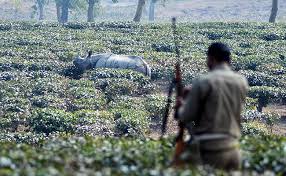Assam’s Kaziranga Tiger Reserve in the eye of storm
One of India’s largest wildlife destinations and tourist hotspots, the Kaziranga Tiger Reserve, in the north-eastern state of Assam, and the global news agency, the British Broadcasting Corporation (BBC) are making news. But, what is the story? Here is a synopsis.
The Kaziranga Tiger Reserve, in the north-east Indian state of Assam, perhaps has the largest population of tigers in the world. Home to the rare one-horned Rhino, apart from various other threatened animal species, migratory birds, diverse flora and fauna, the reserve is a UNESCO world heritage site.
A major attraction for tourists from across India and around the globe, the reserve has also been pulling various documentary makers and journalists for years.
Reciting tales of how the national park successfully conserved the one-horned Rhinoceros, documentarians have captured what is likely an ‘outstanding example representing significant ongoing ecological and biological processes in the evolution and development of natural ecosystems consisting of several communities of plants and animals’, according the authorities.
But recently, a documentarian projected a rather negative picture of the national reserve and its efforts to preserve its wildlife and stirred a controversy, which has now made headlines.
One World: Killing for Conservation, a documentary by the British Broadcasting Corporation’s (BBC) South Asia correspondent, Justin Rowlatt has been accused of inaccurately projecting the conservation efforts being undertaken at the sanctuary.
The documentary throws ‘poor light’ on the anti-poaching strategy adopted by the guards of the Kaziranga Tiger Reserve while protecting the one-horned Indian Rhino. It claims to be revealing the ‘dark secrets’ of conservation, which has been claimed untrue and ‘grossly erroneous’ by authorities, who had the documentary banned.
Not just this, the journalist has been accused of breaching laws and rules by ‘filming after sunset’ and dishonouring the undertaking provided along with ‘deviating from the original synopsis submitted to Ministry of External Affairs (MEA) and its authority’.
Interviewing some people from the neighbourhood of the national park, Rowlatt has showcased that in order to tackle the menace of poaching, a brutal ‘shoot on sight’ policy is being followed by the armed forest guards at the reserve, and that has resulted in an astonishing number of people falling victim to the bullets of the guards than rhinos to poachers. According to the journalist, in 2015, 23 people died as against 17 rhinos.
As a consequence, the Ministry of Environment and Forests and Climate Change (MoEF&CC) had the MEA revoke the visa of the journalist and ban the entry of the global news making organisation for five years.
For distorting the reality, tweaking with scenes and facts and ‘dramatising’ the documentary, the Indian government has barred BBC from filming in any of its 50 tiger reserves for a period of five years.
Released by the National Tiger Conservation Authority (NTCA), the order asks chief wildlife wardens of all tiger range states and field directors of tiger reserves to disallow filming permission to BBC immediately.










